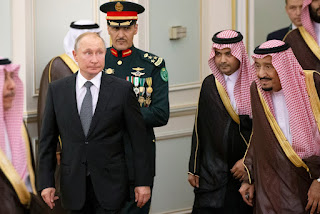The reason is that they believe a US administration devoted to democracy and human rights threatens their hold on power. But there is growing anger in Washington at their behavior, especially as new evidence has emerged of Saudi government support for the 9/11 terrorists. JL
Josh Rogin reports in the Washington Post, image Alexander Zemlianichenko AP:
The U.S.-led effort to thwart Russian President Vladimir Putin is being actively undermined by America’s supposed Persian Gulf allies, Saudi Arabia and the United Arab Emirates. The dictators who run these petrostates are raking in profits from oil sales while sky-high prices are filling Putin’s coffers and hurting the U.S. and European economies. “Saudi Arabia and the United Arab Emirates today are Russia’s allies in the Persian Gulf, by virtue of laundering Russian money and refusing categorically and deliberately to increase oil production.”As Putin uses Russia’s energy to both blackmail and punish the West for helping Ukraine, Saudi Arabia’s de factor ruler, Crown Prince Mohammed bin Salman (known as MBS) and UAE Crown Prince Mohamed bin Zayed al-Nahyan (known as MBZ) have been rejecting calls to do the one thing in their power that would help: pump more oil. Meanwhile, MBS is taking advantage of the Ukraine crisis to pressure the Biden administration into abandoning President Biden’s campaign promise to reset the U.S.-Saudi relationship.
CIA Director William J. Burns’s secret trip to Saudi Arabia last month, revealed this week, is only the latest example of the Biden administration going hat in hand to beg MBS to turn on the taps. This raises an obvious question: Who do these Gulf monarchs consider their true ally — the United States or Russia?
“Saudi Arabia and the United Arab Emirates today are Russia’s allies in the Persian Gulf, by virtue of laundering Russian money and refusing categorically and deliberately to increase oil production,” Rep. Tom Malinowski (D-N.J.) said at the McCain Institute’s Sedona Forum last weekend. “This is a moment where we need more countries to face a choice: Whose side are you on?”
Even before the Ukraine war started, the Biden administration had been backing off its promise to take a harder line with the Saudis, resuming arms sales and sending other senior officials last autumn to see MBS, the man who, according to the CIA, ordered the 2018 murder of Post contributing columnist Jamal Khashoggi. But the Ukraine crisis gave MBS a golden opportunity.
MBS is happy to talk with Putin. But both the Saudi ruler and his Emirati counterpart reportedly refused to take a phone call in March from Biden, even though both countries live under the U.S. security umbrella. MBS is holding out for Biden to meet him in Riyadh — or invite him to the White House. Biden is reportedly resisting, knowing that such a display would be a public humiliation, after Biden promised to make the Saudi regime a “pariah.”
Meanwhile, MBS is actively romancing Republicans. He has given Donald Trump’s son-in-law, Jared Kushner, $2 billion in a private equity fund with zero transparency — a war chest that Trump World could use against Biden in 2024.
The Biden team is acting as though the Gulf oil producers have the upper hand. But that’s only true if the United States fails to understand who really holds the power in these relationships.
“The U.S. has leverage. But they are not willing to use it,” said Ali Al-Ahmed, founder and director of the Institute for Gulf Affairs. “They are not willing to change the relationship, so now MBS controls the relationship.”
Apologists for these Gulf monarchies make familiar arguments. They say that Saudi Arabia and the UAE represent stability and reform in a region threatened by terrorism and Iran. They say that the United States can’t change these regimes, so taking a harder line would just push them into the waiting arms of Russia and China.
But does anyone really believe that MBS’s regional policies are stabilizing? Can any dictator engaged in a brutal domestic crackdown and war crimes in Yemen honestly be called a reformer? Does Saudi Arabia really want to buy Russian weapons and depend on China for its security? If so, good luck with that.
Some doubt a tough approach with MBS would work, but that notion was proved false (ironically) by Trump when he was president. In 2020, when the Saudis were intentionally driving oil prices lower, Trump threatened to pull U.S. troops out of Saudi Arabia — and MBS yielded. Although Trump was generally too obsequious to Saudi Arabia, he knew that MBS was a thug and that the way to deal with thugs is to show strength, not weakness.
The new de facto alliance among Putin, MBS and MBZ is understandable: All three dictators see the spread of freedom, democracy and human rights as existential threats to their holds on power. But the entire rationalization for U.S. partnerships with these Gulf countries is based on their role as important players in maintaining energy stability. If they aren’t doing it, what exactly are we getting in return for our investment?
MBS’s defenders often point out that his 86-year-old father is not long for this world — meaning that MBS is likely to rule Saudi Arabia for several decades, whether we like it or not. In reality, though, that’s the best argument for taking a tougher line with him now. If Saudi Arabia still wants to be a U.S. ally, it ought to start acting like one.




















0 comments:
Post a Comment